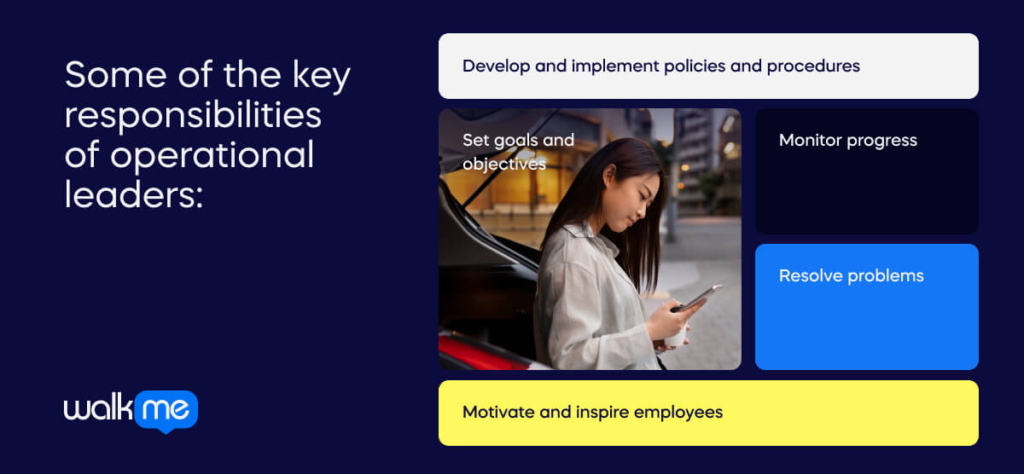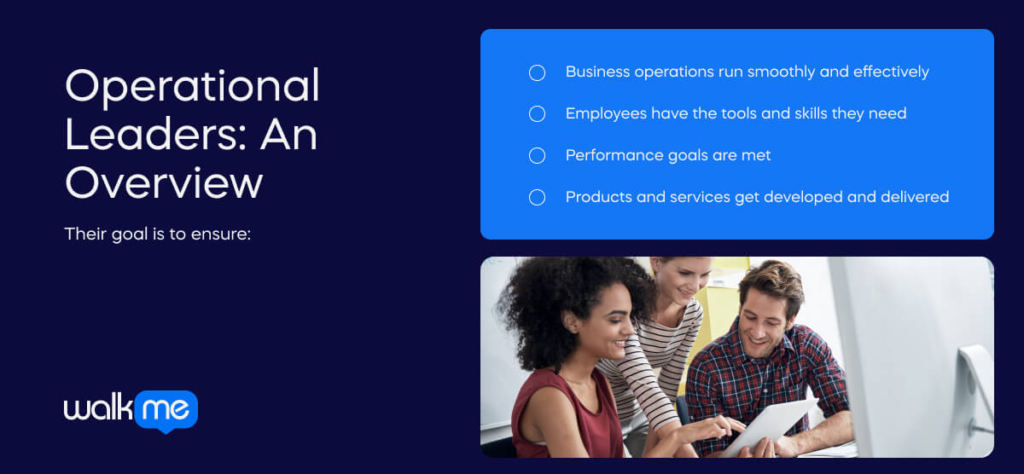How is operational leadership different from strategic leadership?
And how is it different from operational management?
Below, we’ll look at operational leadership in detail, learning:
- What operational leadership means
- Why it matters
- What qualities operational leaders need
First, we’ll explore operational leadership in detail.
What is operational leadership?
Operational leadership is the process of managing and overseeing the day-to-day operations of an organization. It involves setting goals and objectives, developing and implementing policies and procedures, and monitoring progress towards achieving organizational goals. Operational leaders typically have extensive knowledge of their organization’s products, services, and processes.
Here are some of the key responsibilities of operational leaders:

- Set goals and objectives: Operational leaders are responsible for setting goals and objectives for the organization’s day-to-day operations. These goals should be aligned with the organization’s overall strategic goals.
- Develop and implement policies and procedures: Operational leaders are responsible for developing and implementing policies and procedures that will help the organization achieve its goals. These policies and procedures should be clear, concise, and easy to understand.
- Monitor progress: Operational leaders are responsible for monitoring progress towards achieving the organization’s goals. They should regularly review performance data and make adjustments as needed.
- Resolve problems: Operational leaders are responsible for resolving problems that may arise in the day-to-day operations of the organization. They should be able to think critically and make sound decisions under pressure.
- Motivate and inspire employees: Operational leaders are responsible for motivating and inspiring employees. They should create a positive work environment where employees feel valued and appreciated.
Operational leaders play a critical role in the success of any organization. By effectively managing the day-to-day operations, they can help the organization achieve its goals and objectives.
Operational Leaders: An Overview

As you can probably imagine, operational leaders handle business operations.
Their goal is to ensure:
- Business operations run smoothly and effectively
- Employees have the tools and skills they need
- Performance goals are met
- Products and services get developed and delivered
Ultimately, the operational leader makes sure customer needs are met.
They do this by leading the day-to-day operations of the business, making the most of the business’s core activities.
Operational leadership is complex, addressing every aspect of the business model, including:
- Research and development
- Procurement
- Production and distribution
- Marketing and sales
- Accounting and finance
Efficiency is a core tenet of operational leadership. But this doesn’t exclusively mean cost cutting.
It means using whatever tools are available to improve revenue, customer value, and operational efficiency.
In some cases, this can mean cutting costs.
In others, it can mean change management, digital transformation, or organizational development.
Some have called operational leaders the “leaders of leaders.”
They work at the big-picture level, ensuring all the business pieces work together as effectively as possible.
What Operational Leaders Do
This role is crucial when it comes to operational stability, growth, and efficiency.
A few common duties of this role include:
Development of Systems, Policies, and Procedures
Systems and procedures are, in many ways, the bread and butter of this role.
These systems help the organization maintain performance objectives, run smoothly, and function effectively.
Change Management and Leadership
Change has become a permanent fixture within today’s agile organizations.
As mentioned, operational leaders often work together with other business leaders to enact change programs.
These programs, in turn, help organizations operate more efficiently – fulfilling a key function of this leadership role.
Performance Assessment and Monitoring
Another key task is performance assessment.
Since the aim is to optimize operations, the operational leader constantly monitors numbers, such as costs and revenue.
These numbers are then used to develop systems and change programs, as mentioned above.
Leading and Managing Other Business Functions
In one respect, this leader is tasked with leading the organization as a whole.
They lead each department, just as each department lead manages its own team members.
Also, they can be thought of as the central hub for business activities.
They coordinate organization-wide efforts, and usually know about everything happening within the business.
Strategic Leadership vs. Operational Leadership
Strategic leadership is another type of leadership that can overlap with operational leadership. And the two are occasionally confused.
Strategic leaders focus on the business strategy itself.
Their objectives include:
- Defining and expressing the organization’s long-term vision
- Making sure the organization meets short- and long-term revenue goals
- Developing strategies, systems, and structures to achieve organizational objectives
Depending on the size and structure of an organization, this role may overlap with the operational leadership role.
Depending on the size of the company, business owners, or CEOs do all of these duties.
Also, there are times that the two leaders share similar duties.
Change management is one example. Organizational restructuring may be required to meet strategic goals, yet it clearly falls under the domain of both leaders.
Both leadership styles and roles are essential to every organization, regardless of its scale or structure.
However, since we’re focusing on operational leadership, let’s look at what qualities make operational leaders successful.
Qualities to Look for in Operational Leaders
We’ve already looked at what these leaders do.
However, what should you look for in an operational leader.
Whether you are hiring this role or aiming for this role, it is important to understand what qualities set these leaders apart.
Here are some to look for:
Soft Skills
People skills are essential for operational leaders.
They must be able to:
- Communicate effectively
- Influence others
- Be respected and liked
Like any other business leader, this leader must be able to compel action, without being dictatorial.
Marketplace Knowledge
Like strategic leaders, operational leaders must understand their marketplace inside and out.
They must also understand their own organization from top to bottom.
This in-depth knowledge is core to their expertise, and it’s what enables them to do their job.
Big-Picture Thinking and Problem-Solving
Business problems require logic, analytical capability, and top-down perspectives.
This leadership role in particular requires the widest perspective within an organization.
These traits enable leaders to create the systems that improve daily operations.
Innovation
Creativity and innovation aren’t words usually associated with “operations.”
However, these traits can help you discover new solutions to old problems.
In today’s digital economy – which is driven by disruption and innovation – this trait can help you devise creative workplace solutions, workflows, and operational models.
Final Thoughts
Operational leaders are essential for the health of any organization.
They ensure that the organization runs smoothly, meets its revenue objectives, and performs efficiently.

